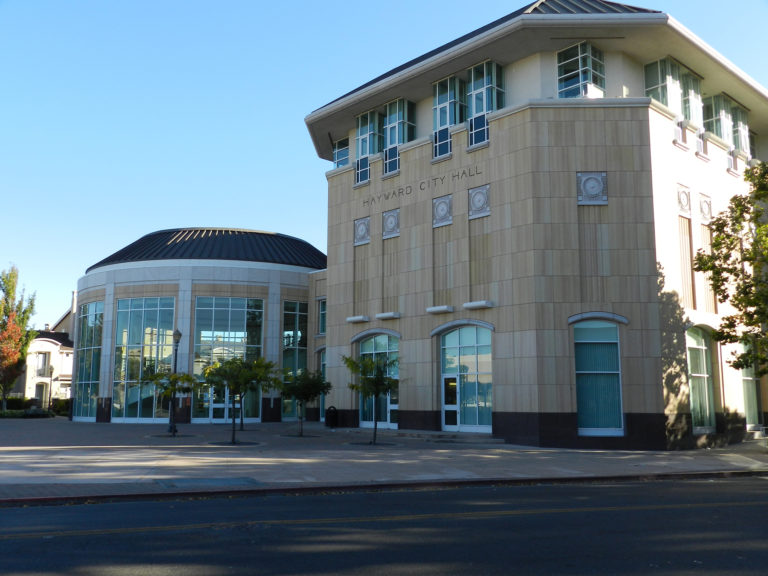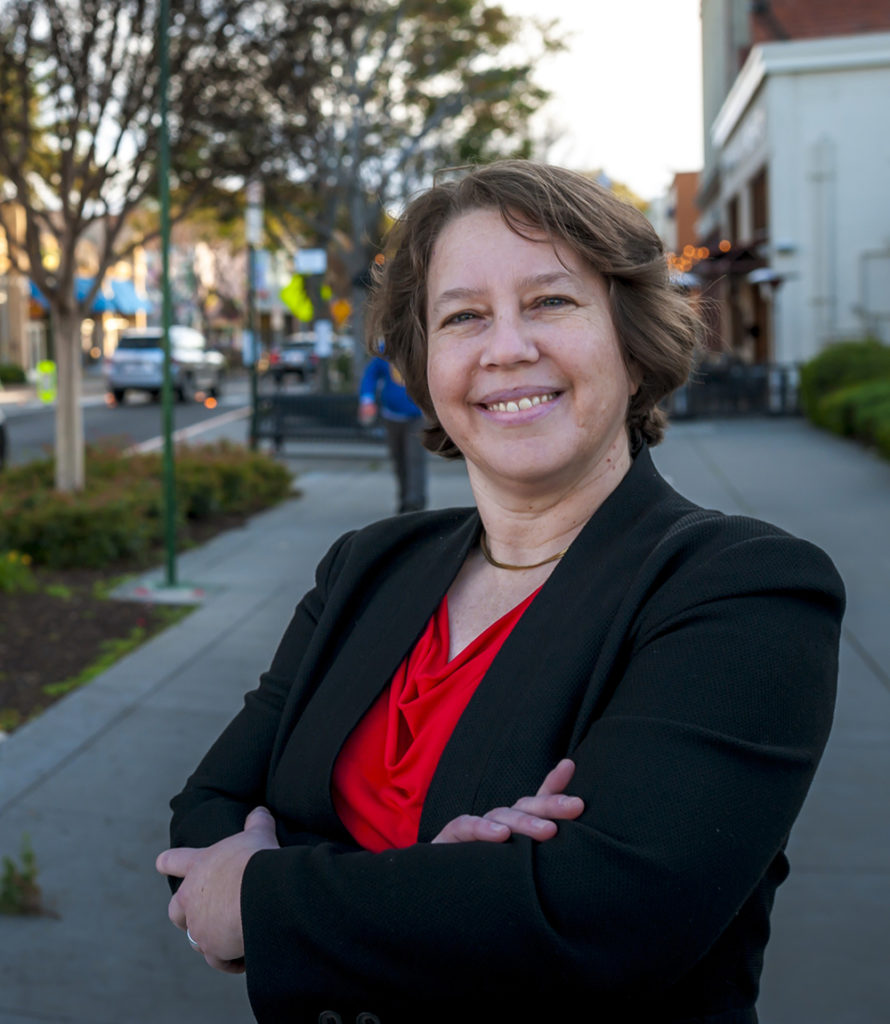
Although COVID-19 is a global pandemic, many of the decisions and actions that address this unprecedented challenge take place at the local level. ESAL spoke with Sara Lamnin, a city council member in Hayward, CA, since 2014, about ways that city government tracks emerging information on COVID, and how scientists and engineers can support their communities’ responses. Lamnin holds a bachelor’s degree in recreation therapy and a master’s degree in healthcare administration.
CS: What are some of the ways a city council gets up-to-date information about a topic like COVID?
Lamnin: Every way! There are the normal channels that community members typically use – emails, social media, phone calls. Then there are the city staff and the city manager feeding us information, too.

Sara Lamnin, Hayward City Council Member
As a council member, you belong to many different organizations – affinity groups, professional development groups, politically-minded groups, local elected officials groups. Recently, they have all decided to do webinars about COVID or create opportunities for local officials to talk to each other. It's great, because people can share information and best practices. Everything keeps changing, too. Who the expert is on any given topic is not nearly as cut and dried as it is for something like city planning.
CS: With so much information coming in, how do you assess what needs attention?
Lamnin: I look at the framework of the person giving me the information, whether they have lived experience on the policy issue, or if they have training in it. Also, do they have an additional agenda? Then there is also a bit of testing out of the information. Right now the CDC, for instance, seems to be an obvious source – is the information consistent with what they’ve said, or the World Health Organization, or immunology experts? The same sort of thing applies locally. What is our Public Health Department saying? They are recognized experts, so does the information seem to be consistent with other authorities?
CS: When information or recommendations are changing so quickly, like the guidance on masks, how do you help your local community follow those recommendations?
Lamnin: You know, I just got an AP news alert – the CDC says, “yes, wear a mask.” Okay, but people can't get masks and we don't want them to pull masks from the healthcare providers or the frontline people who absolutely need the mask. Yet, I certainly don't want anybody sick if wearing a mask is the best thing to do. Then there's other research that says, well, if you wear a mask and have respiratory issues, it can make it harder to breathe.
And then there’s the question of what it means locally and practically. I've read that materials like vacuum cleaner bags or multiple layers of polyester blend are less permeable. People have those things around their house. Does it make sense to look at a quick and easy mask that meets standards to an extent? At the same time, I don't want so much comfort that people stop doing the thing that I really need them to do, which is stay home. I can't be exhaustive and spend the next two years studying masks, but I may be able to quickly get my hands on information that is well-researched and is based on good science.
CS: How can people with a technical background support their communities at a time like this?
Lamnin: There are lots of ways. If somebody is just really good at reading lots of information quickly and synthesizing it, that's really helpful because city council members don't have their own staff. If there's something that I specifically want to know about, I take on interns or I ask community members who have time and expertise and the ability to read through things, even if it's not their field. The ability to critically analyze information and turn that around into key points is actually a really helpful skill.
Innovation is always great. When I first heard about the whole concept of people making masks, I thought, “Well, that's nice. It keeps people busy during this time.” But the more I learned about it, the smarter I see it is. So people have talents and skills that could be used. They're good at building something or they're good at sewing something or they're good at realizing that this kind of fabric is better than that one.
One of the other infrastructure needs that's really critical, and I'm not entirely sure how we're going to solve, is the digital divide. Our Hayward students were about a hundred Chromebooks short. Fortunately we were able to connect most of our students, but there are still students who don't have a computer at home. Then, of course, there is the issue of WiFi capacity. We have some repeaters in the city and we're happy to use those, but they don't work through walls. So it’s actually a great time to solve the digital divide.
Oddly, it's also a good time to think about issues like logistics and systems improvement for areas like food access or housing. We're going to have more people who need food pantry services. So if you've got time, and your family's well, go volunteer. If you have funds that are available, donate. And if you're good at systems analysis, come talk. Let's take a moment and think through how we could do this better.
CS: Stepping back for a second, what inspired you to run for city council?
Lamnin: After receiving my degrees, I primarily worked in long-term care and rehabilitation, and then in community-based nonprofits. Running for office some day was always sort of a joke with my friends. But what prompted me to really do it was being involved in one of my professional societies.
There was a piece of federal legislation that had enough support, from both sides of the aisle, to pass without debate. The speaker of the house wouldn't let it on the floor. A policymaker has three choices, right? They can listen to the community and say, “That's great, let me get out of the way.” Or they can say, “That's great that you dug into the issue, but you've missed something big so let's work together to remediate that.” Or you could do what this guy did, which was to just say, “That doesn't fit my view of the world.” I really wanted to do things differently. So I got involved in the city commissions, and started to learn the pathway to city council.
CS: Do you have any recommendations for people with STEM backgrounds who want to get involved in their communities?
Lamnin: The current crisis is a great example. Whether you like the current administration or not, the people making decisions are not people with a scientific background. The ability to think through a situation strategically and logically is really valuable. I appreciate working with folks who can do that kind of analysis.
I absolutely encourage folks with STEM backgrounds to get involved in a commission. It's a volunteer position and it's a great way to start to learn how a city works and to start to learn what is important to do a deep dive into, and when it is important to say, “Okay, did this happen? Good, let's move on.” There's always a balance in public policy between some details we need to stay out of, and some we need to pay attention to and make sure that the community's voice did get heard. Learning that is an art.
Being on a commission is a good way to start to learn how you navigate a public policy system. And once you've done that for a while, then absolutely look at running for office. Not just the city councils or the bigger offices, but the parks and rec department if you think open space is important. If you have children, look at the recreation board. Look at the wastewater treatment board, the water district board, and the school board. If you care about an issue, absolutely people want your expertise.
Find more articles about how engineers and scientists are contributing to the COVID-19 response here. ESAL has also compiled a list of many other ways you can help your community respond to COVID-19. Have additional ideas? Please send them to info@esal.us.
Do you have a story to tell about your own local engagement or of someone you know? Please submit your idea here , and we will help you develop and share your story for our series.